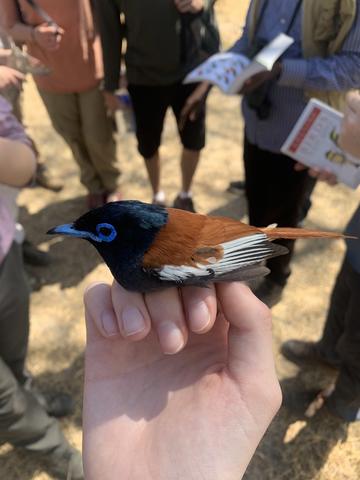Where did you go on your field course?
I was lucky enough to go on the Tanzania field skills course as part of our second-year MBiol in Biology course. My original field trip was cancelled due to Covid-19, but when Tanzania was announced as an alternative, my sponsor (Santander) said they were happy to still fund the trip. I have a particular interest in reptiles and insects, so I was quite sceptical about the trip being just about the iconic mammals in David Attenborough documentaries, but I couldn’t have been more wrong. Tanzania was an oasis of wildlife and I saw more birds, bats, reptiles, insects and plants within two weeks than I thought humanly possible! It was utterly incredible.
What did you get up to on this field course?
I’d only taken a flight before when I was very young, so an 11-hour plane journey was a new experience. We stayed in Ruaha in southern Tanzania, meaning three days of bus travel from the capital; it’s a good job there were giraffes on the roadsides to keep us from getting too bored!
In Ruaha our two weeks were spent working with an organisation called Lion Landscapes. Their aim is to reduce human-wildlife conflict between pastoralist communities like the Maasai peoples and large carnivores. Ruaha is home to the largest national park in Tanzania and hosts one tenth of the world’s lions, so interactions between the big cats and people can be scarily common for both parties involved.
On the field trip, we learnt about how Lion Landscapes is working with communities to develop new livestock protection measures that reduce attacks on cattle: pastoralist tribes commonly kill lions in retaliation after their cattle are attacked, so reducing attacks helps conserve lion populations as well as safeguarding livelihoods. We also learnt about their community engagement programmes, camera trapping work and education projects which all help foster coexistence between humans and wildlife in the Ruaha landscape – it was so inspiring to see conservation in action rather than on a lecture slide!
We were also lucky enough to be joined by two staff members from the University of Dar es Salaam for a large part of our trip. We learnt how to ethically trap animals, such as birds and bats with mist netting, how to capture and handle moths and butterflies for population surveys, how to use wildlife camera traps, and gained carnivore identification skills. The trip was packed full of adventure and when we weren’t in the field learning new techniques, we heard speakers from the Tanzania Wildlife Management Authority (TAWA), Lion Landscapes staff and Tanzanian researchers.
How did this field course help your studies?
Although I grew up in a rural area, I had only ever interacted with nature on an informal basis. Going to Tanzania allowed me to experience how ecological fieldwork is carried out, and I got to see species I had read so much about in the real-world.
Importantly the trip helped me to see how conservation is really done. It doesn’t always go to plan after conducting some population analyses – for a conservation programme to be successful it has to consider the wider, real-world context, the people involved and the actual feasibility of any measures chosen. I learnt that a conservation programme requires tweaking, re-tweaking, or sometimes scrapping if it’s not working with another avenue taken instead, and that it requires collaboration between all stakeholders involved.
That relates to probably the most important aspect of Biology I think the trip helped me explore. Going to Tanzania sparked conversations within the group about our positions as young scientists from an incredibly privileged, well-funded western university. I had always thought I was aware of the dangers of ‘parachute’ science when conducting fieldwork in other countries, but I realised there was so much more to consider than gaining research permission from the host country.

An African paradise flycatcher caught as part of the skills training sessions to help us learn about how to ethically catch animals for population studies
Collaboration with local institutions, setting shared research goals and ensuring the communities involved share research benefits are essential in proper partnership – I came away from my time abroad with a better sense of how to approach future research projects and a better appreciation of my position as a scientist in a globalised world.
It’s easy to learn about biology in a lecture theatre, but I don’t think you get a true appreciation of how ecology and conservation works in the real world without seeing it in the field. I applied for Oxford partly because of its emphasis on helping us develop into scientists, and field trips like this are a vital part of that.
What did you enjoy most about the course?
An impossible question! I can’t think of a particular day that stood out to me most, but I’d probably say the best part of the trip was seeing such an incredible diversity of plant and animal life. Tanzania has 1/3 Africa’s plant species and 20% its large mammals – every where you turned, you were met with new species to get excited about. Some of my favourite sightings included a tropical house gecko, an Angola white lady butterfly, and the African paradise flycatcher we caught during mist netting. I’m still so overwhelmed by how lucky I was to see so much incredible wildlife.